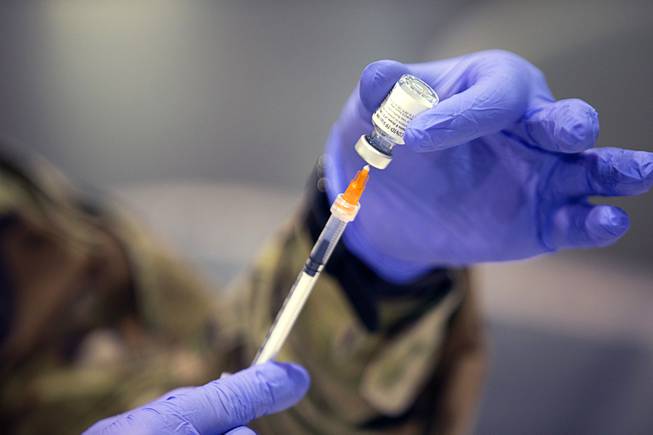
A Nevada National Guard member fills a syringe with vaccine at a vaccination center in the Las Vegas Convention Center’s South Hall Thursday, May 13, 2021.
Thursday, Dec. 2, 2021 | 4:16 p.m.
Nevada has become the first state to implement a health care premium surcharge on some 5,000 state employees not vaccinated against COVID-19 starting in July 2022.
The Nevada Public Employees’ Benefits Program, which manages the health program for 43,000 members and 27,000 dependents across the state, approved a policy this morning to charge state employees $55 a month plus $175 a month for any unvaccinated dependents over the age of 18 unless they provide a legitimate health or religious exemption by the end of the open enrollment period, which will be assessed July 2022.
The policy will help cover the costs of COVID-19 testing and hospitalizations associated with unvaccinated members, Laura Rich, executive officer of the Nevada Public Employees’ Benefits Program (PEBP), said.
PEBP has been paying for COVID-19 testing since April 2020, spending more than $3 million, Rich said. But on Dec. 17, funding from the CARES Act will be gone, and the burden of the testing costs will fall on the program, she said.
And COVID-19 testing is expected to increase with the implementation of both state and federal mandates. On Nov. 4, the Biden administration and Occupational Safety and Health Administration announced a requirement for large employers to administer testing for unvaccinated workers, Rich said, and employers can decide who will pay for it.
A state mandate requires testing for all unvaccinated employees, with the exception of those who work in places where at least 70% of the staff has been vaccinated. While the 70% threshold has limited the number of employees needing to get tested, the threshold will likely be eliminated in the future, Rich said.
Rich estimates that the surcharges would raise $18.4 million annually, and COVID-19 testing could total between $12.3 million and $24.7 million. The total cost depends on how many employees will be subject to testing, Rich said.
Employees’ monthly health insurance premiums range, depending on the plan, from $44.63 to $144.18 for solely the employee; $240.77 to $439.87 for the employee and spouse; $118.18 to $255.06 for the employee and children; and $314.33 to $550.77 for the employee, spouse and children.
Rich also said that a recent survey indicated that about 70% of unvaccinated employees would be encouraged to get vaccinated if a surcharge was implemented. When companies like Delta implemented a surcharge, they saw about a 20% increase in vaccinations, Rich said.
At a meeting Thursday, out of about a dozen people who spoke during the public comment period, two expressed opposition to the surcharge, while others were either neutral or spoke about something else.
“I hope that the PEBP board recognizes that the surcharge is discriminatory,” said state employee Rosalie Garcia, who called in to speak against the surcharge.
She compared it to charging smokers or people with diabetes more, saying that the membership must be treated “equitably and fairly” and that specific members should not be targeted.
Terri Laird, executive director of Retired Public Employees of Nevada, said that while the organization will not take a position one way or the other on the issue, “the surcharge will burden many employees” who are already dealing with a high cost of health care. Laird urged the board to find other alternatives to cover COVID-related costs rather than burden employees.
Rich confirmed during the meeting the legality of the surcharges, saying that it is similar to smoking surcharges that have been implemented in the past. HIPAA prevents plans from discriminating based on a health factor, but it allows it for vaccinations. The U.S. Department of Labor has also confirmed that employers can implement surcharges against unvaccinated employees.
If the surcharge was not approved, Rich said, the program would have to raise premiums for all employees or reduce benefits across the board.
